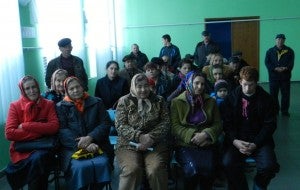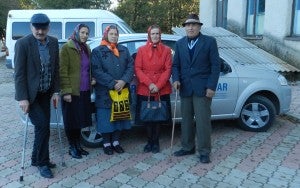Older Women and Men with Disabilities Improved Access to Local Public Services in Plopi Commune, Moldova
Date:
132 women and men with disabilities, older women and boys as well as boys and girls from vulnerable families of Plopi community received access to local public services through special transport facility.
The community of Plopi is located in South of Moldova, over 140 km away from Chisinau, the capital of Moldova. The commune consists of five villages – Plopi de Sus, Plopii de Jos, Taraclia, Hirtop and Alexandrovca. Plopii de Sus is the largest village, where the Mayor’s Office and majority of local public institutions and service providers, such as school, social assistant’s office, health care facilities, post office and others are located. The smaller villages of the commune are located 2-12 km away from the main village. The particularity of the commune is that the smaller villages are characterized by higher rates of poverty, and are populated predominantly by ethnic minorities (Bulgarians).
The community members were concerned with a miserable situation of women and men with disabilities, lonely and abandoned older persons, particularly women, and their limited or no access to local services available in the main village or Cantemir town. Thus, the community profiling exercise identified that a significant distance between the small villages, and the public institutions was the main barrier for vulnerable women and men to enjoy their right to basic services. Women of Plopi commune, who make the 60% of Plopi’s older persons, 64% of older persons with disabilities and who are mainly widows represent the most disadvantaged group and were highly negatively impacted by the situation.
The community profiling exercise was one of the key steps in the community mobilization for empowerment work of the Joint Integrated Local Development Programme of the government of the Republic of Moldova, implemented by the UNDP, UN Women and funded by the Government of Sweden. The programme team helped the community in collecting information, analysis and identification of the pressing needs and development priorities. The problems identified by the community members were fully acknowledged by the local public authorities. This became essentially important step of the community mobilization process. At the next stage, the Programme facilitated forming of community initiative group who cooperated with the Mayor and local councilors to ensure inclusion of these priorities into the Plopi Local Socio-Economic Development Strategy (LSED).
Supported by JILDP, the community initiative group developed a project proposal on improvement of access of older women and men, as well as persons with disabilities to the basic local public services. Together with the staff of the Mayor’s office the group decided to buy a car which would deliver the women and men from the small villages to the main village or Cantmir town to visit doctors, social assistants, local administrations etc. As a part of the LSED implementation the local authorities co-funded the community development initiative.
The process of the project elaboration was highly inclusive and participatory. Thus, single parents and many children families joined the community group of women and men with disabilities and older persons to jointly develop the project proposal. To ensure sustainability of the initiative, the community group members put a lot of thought in elaboration of the schedule or visits, community car regulation and ensuring full community control and monitoring over this new transport facility.
Having received a financial support of the Joint Integrated Local Development Programme, the community initiative group was closely involved in selection and procurement of the car to make sure it meets all their requirements and expectations.
Procurement of community car older and disabled women and men have considerably increased their access to the basic local public services provided in the main village and Cantemir town. Now 132 older women, persons with disabilities as well as single mothers and fathers enjoy better access to public institutions and service providers in the community of Plopi.
“We have never dreamt that older and disabled people of our village can have a special transport. I know for sure that with this new community car older and disabled women and men will see a change for the better in their lives.” – Feodora Papusa, Plopi village
The community project was implemented as part of the Joint Integrated Local Development Programme, implemented by the Government of Moldova with the assistance of UNDP, UN Women and financial support of the Government of Sweden.

